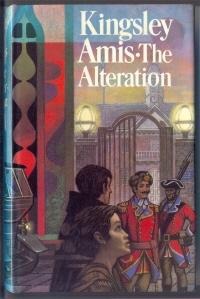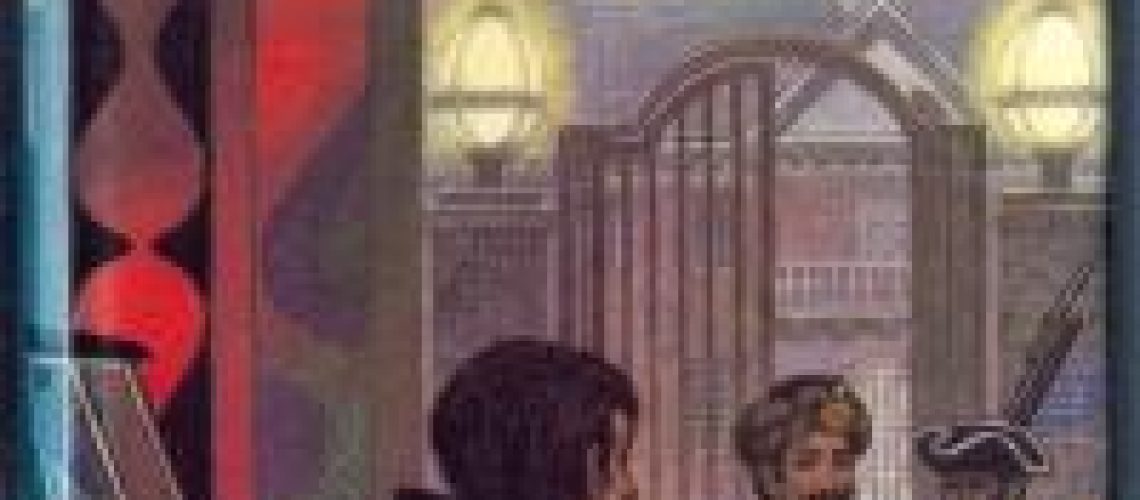A Darker Mirror Still: The Alteration by Kingley Amis
We live in an age where a reality TV star ascended to the Presidency and conducted his Presidency through Twitter. We are in a world where England’s complicated relationship with Europe has turned positively rabid. Intractable conflicts in the Middle East burn on and on and the entire world seems to have gone into a “Crazy Years” phase. Just where can one go to find an alternate world, a dystopia to forget the troubles and trials of our world for a little while? 1984 is a bestseller, but perhaps you’ve read or re-read it, and don’t want to delve into the story of Winston Smith again. Perhaps you’ve re-read Philip K Dick’s The Man in The High Castle and don’t want any more Nazis vs Japanese Empire action. Margaret Atwood’s Handmaid’s Tale is always a choice, but perhaps you’ve re-read that one, too, and with recent events in abortion restrictions, maybe that one hits too close to home. Maybe you want a dystopia of a different sort, a dystopia that gets less play, less attention, a world less visited. A world less seen but no less dark than the usual dystopic alternate histories.
Submitted for your approval: Kingsley Amis’ 1976 novel The Alteration.

The historical Points of Divergence for The Alteration go back to the 16th century. In the turbulent political and social changes following the invention of the printing press, Martin Luther’s 95 theses posted to a church door, in our timeline, led to the Protestant Reformation, by way of terrible conflicts that plunged Europe into religious and political wars that devastated the continent. In Amis’ world, Luther’s schism never breaks from the church, and in fact he becomes Pope. Unfortunately, in our world as in this world, Martin Luther was strongly anti-Semitic, and his intolerance for the Jewish people only became more pronounced when he assumed the Papal Throne. Beyond the Papacy itself and its new Inquisition, the political change to Europe is that Arthur Tudor, son of Henry VII of England, manages to survive. This is a turning point I’ve never seen much done with in alternate histories, although I do note that Anne Lyle did make use of it in her Night’s Masque alternate fantasy history novels. Arthur’s survival leads to a son, a civil war between that son and Henry of York (Henry VIII in our world), and a resulting England that is staunchly Catholic.
The actual story of The Alteration focuses on Hubert Avril. In the Year of Our Lord 1976 he is ten years old, and has the most beautiful singing voice in St George’s Basilica, the greatest church in Christendom. Such a gift is rare and beautiful and there are those who would preserve that singing voice by making sure his voice does not change–by castrating him, whether he wants it or not. But Hubert himself does not know what he wants. Thus Amis’ title refers both to the alteration that Avril may or may not undergo, as well as to the dark history that we have slid into by opening the novel. Avril’s story, and his struggles to escape or come to terms with his fate, is the personal narrative that Amis uses to explore his world, his dark history. Amis uses Hubert’s point of view as the ground-level exploration of a life within this alternate history, and other points of view, to give a 30,000-foot perspective on the dark world that he has created for Hubert to inhabit.
That world, that dark history that wasn’t, is, for me, really where one can sink into its comfortable, placid and serene totalitarian state and realize that it really could be worse. In the world of the Alteration, Science is a dirty word, and technology is suppressed and repressed, firmly and uncompromisingly. In our age of alternative facts, there are plenty of alternate facts on display in Amis’ world. Electricity has been discovered, but is strongly held back, to the point that complicated workarounds and doublethinking about what it is and how it occurs is necessary for the primitive quasi-steampunk vehicles of the setting to work. Even celestial observations and astronomy are engaged with and performed with a strange doublethink of using a heliocentric solar system only as a mathematical fiction. This is an amplification to the point of absurdity of the epicycle system of celestial mechanics that was the prevailing understanding of the heavens before Copernicus. Amis just takes the real life science of that time, to extremes, here, in his alternate 1976.
Not quite a dystopia, the alternate history that The Alteration really brings in mind is Keith Roberts’ Pavane, which shows strong similarities in a Europe where industrialization, both in the good and the bad, never takes hold. However, unlike the gentle push away from technology in Pavane by its faerie agents of change, here, the Catholic church holds back progress in many fields with much less intended benevolence. Amis, unlike Roberts, wants to make it clear this is not a world to ever be yearned for.
The politics of The Alteration reflect its arrested scientific development, too, keeping the world in a 17th-century deep freeze of politics. The united Catholic West has a permanent enemy with the Turks, in a slowly simmering conflict always waiting to become hot. In this way, Amis marries the Cold War between the West and Russia with a strong Anti-Islamic theme. Amis also understands that Anti-Semitism and Anti-Islamism are often riding along in the same cart.
However, Amis turns up the dial on the darkness of this world Long before Samuel Huntington’s The Clash of Civilizations, Amis imagined a Catholic Christian-Turkish Islamic cold war that justifies the Catholic Church to contemplate and do so very dark things to its populace. For all of its brutal but outwardly placid repressive world, there are too many mouths to feed, and the Papacy has a plan that Minister Wilford of Snowpiercer would understand and approve of.
The style of writing is one of dense packing of details and information, and unpacking Amis’ work means that a too-quick read can lose some of the details. In single mentions and long sentences, Amis points to places near and far, to alternate versions of people in our world who are in his, and paints a picture of his world. Amis has so clearly seen his alternate world, that he is eager to offer it to his reader. The novel is written for an audience of a literate, informed reader. In this day and age, having Google handy while reading this book is most definitely something I wish I had when I first read the novel in the mid-90s. My re-read, with two decades more of learning, plus Google, unlocked even more of the novel’s alternate world for me.
One of the special joys in the novel, in clear appreciation and paralleling to Dick, is Amis’ mention and evocation of fake alternate novels and alternate history novels (called Time Romances) secretly and covertly read and shared within his dark world. To put the finest point on it, there is a novel in this universe by one Philip K. Dick called The Man in the High Castle. This novel is the Grasshopper Lies Heavy of Amis’ world, imagining that its English-Catholic world does not come about thanks to a change in the past. But like the book within the book in Dick’s book in our world, the change leads to a world that is similar to ours, but isn’t exactly ours. Pavane also has a version in Amis’ world, and there is even an alternate Lord of the Rings read covertly. And Gulliver’s Travels? The hero of that story is “Saint Lemuel” in the version written in Amis’ world.
While it’s not likely or realistic to have a timeline change five centuries in the past to have such Easter eggs occur, it provides a pointer to what Amis is doing in the novels. Underneath the story of a young choir-singer in a brutal world, Amis is pointing at our own world, and its faults, as the true story that he wants to tell. Written in 1976, a novel where the West is in a nasty cold war with the Middle East, a world where repression, authoritarianism, and anti-science views rule the day is ever more relevant today, in 2024. Amis wrote far more presciently, and darkly, than he could ever have imagined. The Alteration remains a dark, beautiful jewel, awaiting readers new and old in our own time to see our world within its reflection.







